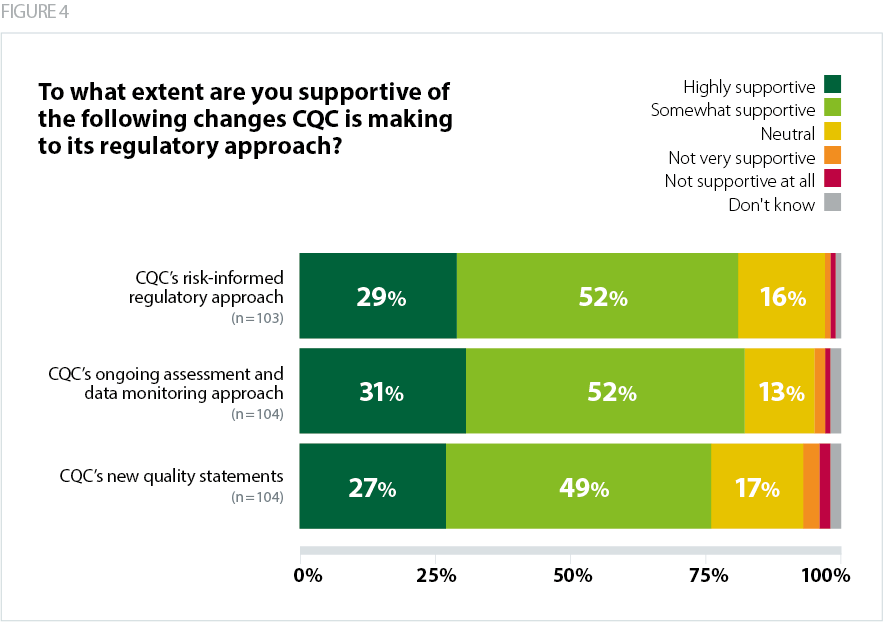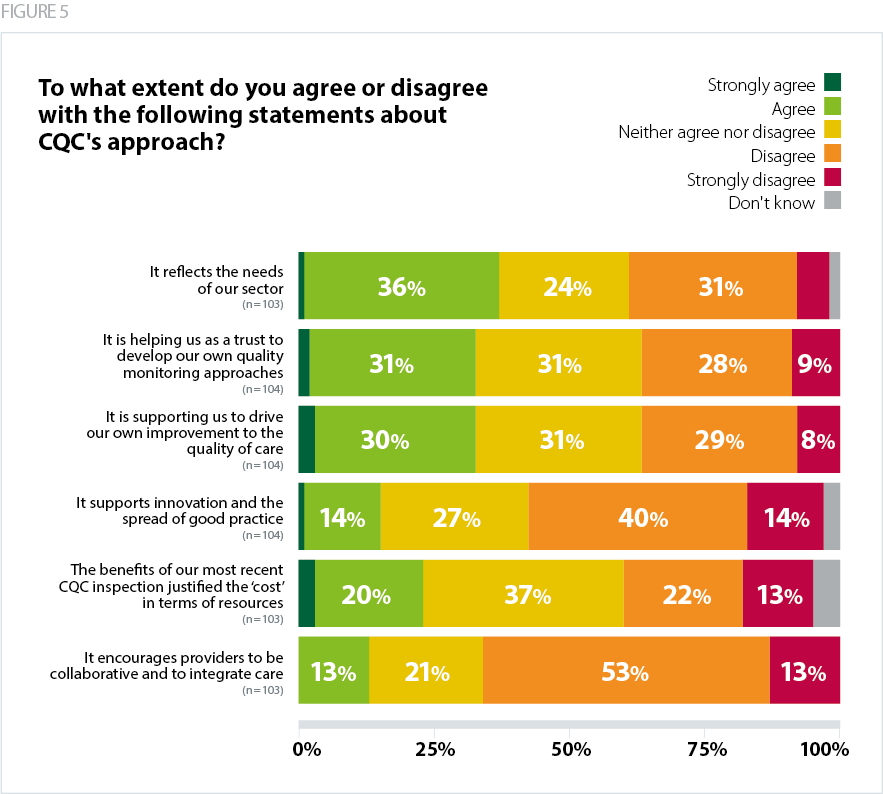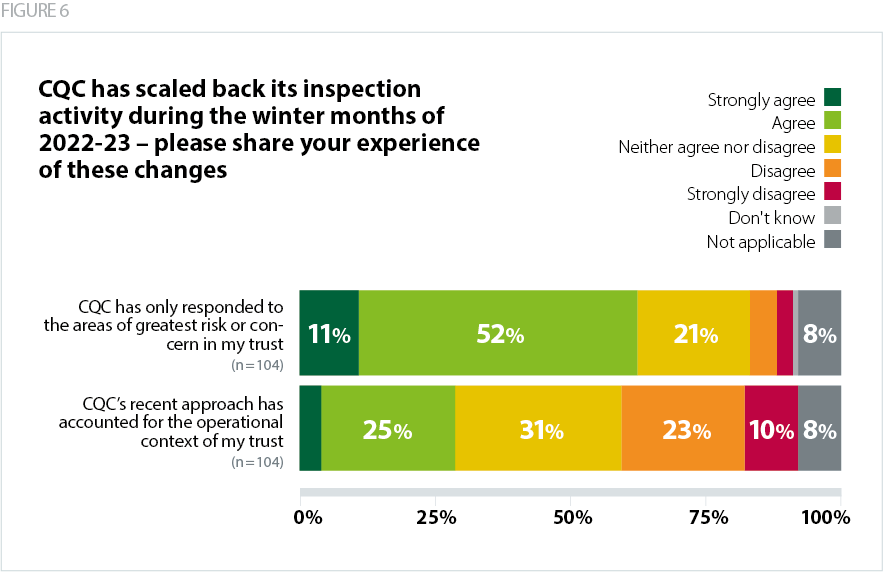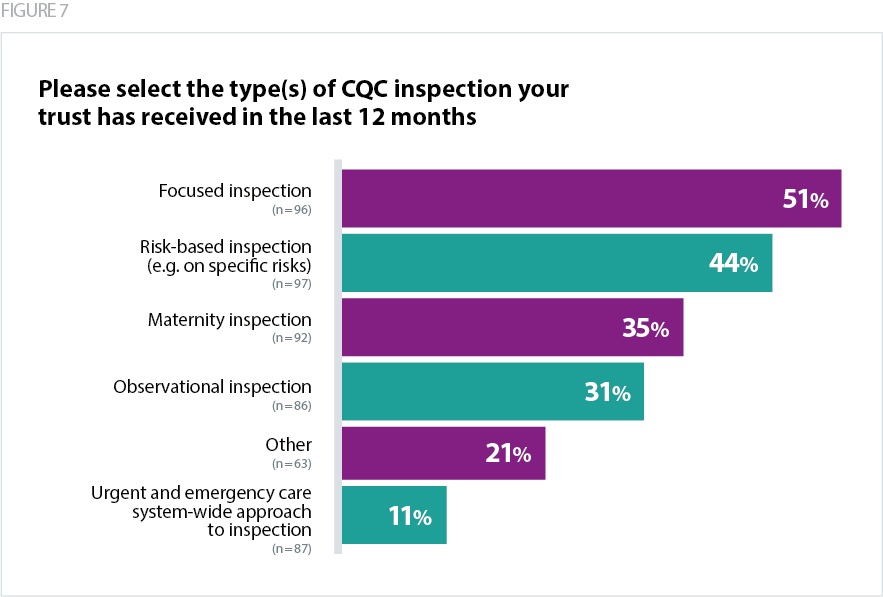Over the past two years CQC has been working to make the ambitions of its new strategy a reality. It has committed to 'smarter', risk-informed regulatory style, based on flexibility, objectivity and responsiveness, and has been trialling and testing aspects of this new approach with patients, providers and stakeholders.
We have asked members for their response to CQC's ambitions for transformation, alongside their current experiences of CQC regulation.
Views on CQC's developing regulatory approach
Figure 4 below shows overwhelming support for CQC's developing approach, in similar vein to last year's results. Responses for all statements were positive, with around eight in ten respondents being supportive of each one:
- Just over four in five respondents (81%) were supportive (52%) or highly supportive (29%) of CQC's risk-informed regulatory approach, focusing on areas of risk and safety concerns.
- A similar proportion (83%) were supportive (52%) or highly supportive (31%) of CQC's ongoing assessment and data monitoring approach, aiming to move away from routine inspections and to be more flexible and responsive to changes in quality and safety within services.
- Just over three quarters (76%) were supportive (49%) or highly supportive (27%) of CQC's new quality statements, developed in co-production with people who use services and set to replace the current key lines of enquiry, prompts and ratings characteristics.
- Only between 2 and 5% of respondents were not supportive of these changes.

Respondents were cautiously optimistic about changes to CQC's approach. They welcomed them in principle, but acknowledged they did not have the evidence to make an informed judgement yet. One comment said that the new framework appeared to be more dynamic, giving a real time assessment rather than a snapshot in time.
"For me, the proof of this risk-based approach will be in its implementation - it is a commendable, modern approach that makes sense, but it depends on what they class as 'risk and safety concerns' - I hope this is not judged simply by sensational newspaper headlines."
Other respondents identified the areas where CQC needs to develop and change to improve its approach. These included:
- Better reflecting the system and operational context in its reporting.
- Better supporting providers to improve.
- Being more collaborative in its dialogue with trusts.
- Being more transparent as to the components of a 'good' or 'outstanding' service.
- Using the right sources of information/intelligence to make its judgements.
- Being more objective when rating/re-rating services.
- Re-considering its approach to providers rated as 'requires improvement', given there was a shared feeling that these providers were 'stuck' in this category and not prioritised for re-inspection due to being considered low-risk.
"The flexibility in ratings needs to move both ways - I am a bit concerned that CQC will be quick to downgrade a trust based on one piece of data but will require months of improved performance to upgrade - needs to be equitable in both directions. Also, the data boundaries need to be transparent - what does it require to be good / outstanding etc."
There were also those who were sceptical about the success of CQC's programme of transformation. One respondent stated that fundamental change in the culture of CQC was needed to bring about the desired results.
"Based on its track record we can have no confidence in its ability to deliver this approach."
Experiences of CQC regulation
As was the case in last year's survey, trust leaders were much less positive about their current experiences of CQC regulation than they were of the regulator's ambitions for the future (see figure 5 below).
- Only 37% of respondents agreed (36%) or strongly agreed (1%) that CQC's approach reflected the needs of their sector. This is down from 50% last year (48% agree, 2% strongly agree). The same percentage (37%) disagreed (31%) or strongly disagreed (6%) with this statement.
- More people disagreed (37%) than agreed (33%) that CQC's approach was helping their trust develop their own quality monitoring approaches.
- Fewer people agreed (23%) than disagreed (35%) that the benefits of their most recent CQC inspection justified the 'cost' in terms of resources.
- 15% of respondents agreed (14%) or strongly agreed (1%) that CQC's approach supports innovation and the spread of good practice, while over half (54%) of them disagreed (40%) or strongly disagreed (14%).
- Trust leaders responding to the survey were least optimistic about CQC's ability to encourage providers to collaborate and integrate care (66% disagreed).

Most of the in this section were negative about aspects of CQC's current regulatory approach. When commenting on CQC as a whole, several respondents queried whether the regulator had become too 'bureaucratic' and 'out of touch' and whether it was 'fit for purpose'.
"Hard to imagine how it could be worse."
"I used to really respect the CQC process but recent personal experience and shared experience of others has changed that and frankly I don't feel this regulator is fit for purpose any longer."
A number of comments questioned the expertise of CQC inspection teams. Similar to last year's survey, trust leaders reported discrepancies between the inspection they experienced and what was reflected in the subsequent inspection report. They also spoke of factual inaccuracies, lack of appreciation of the operational context, and limited opportunities to challenge the process.
"The CQC inspectors appear to be disorganised, uninformed, often unprofessional in approach and add no value to an already challenged system."
"Latest CQC inspection on maternity services was conducted by an inexperienced team and with an agenda of finding inadequacy. The draft findings and rating were disproportionately negative to what the inspectors found."
There were some positive comments, including about a recent inspection which, despite a rating downgrade, had helped the trust reset its direction. Another respondent appreciated the recent 'positive' light touch approach of the regulator. Some contrasted a negative overall view of the regulator with a positive experience of their local team. Trust leaders valued the consistency of relationship and the trust built with their local CQC teams, and struggled where this was lacking.
"We have found the CQC inspections to be fair and evidenced based, recognising the operational context we have post-Covid ."
"My recent experience of interactions with the CQC is patchy… On the one hand, I find our local team approachable, responsive and often helpful. However, overall, I find the organisation to still be overly bureaucratic, slow and out of touch. I am particularly frustrated by the amount of time it takes for them to deal with relatively simple changes to registration."
CQC's response to winter pressures
During the winter months of 2022/23 CQC recognised the unprecedented pressures in the sector, and adapted its risk-based approach (applied since the Covid-19 pandemic), to only respond to the most serious risks to patient and public safety in NHS services. It also made adjustments in its approach to registration, and to the inspection of adult social care services, to create more capacity for discharge and thus alleviate pressures in health and social care. We asked members about their experiences of this scaled back approach.
While a sizeable majority of respondents (63%) agreed (52%) or strongly agreed (11%) that CQC had only responded to the areas of greatest risk or concern during the winter months of 2022/23, a much smaller proportion agreed that the regulator’s recent approach had accounted for the operational context of their trust (29% agreed or strongly agreed, while 33% disagreed or strongly disagreed).

Despite CQC's reported approach to scale back on-site activity during the winter months, in their comments trust leaders were mainly negative about the way in which CQC handled its activity during the unprecedented winter pressures. They felt CQC did not do enough to account for the context, and in some cases completely disregarded it. One respondent said they still had an inspection during this time, that was not linked to any areas of concern.
"CQC reports on emergency departments and urgent and emergency care usually say that they noted how busy it was and that we are stressed. That is as far as accounting for context goes."
"At our last inspection staff were explicitly told that they weren't interested in the context, they were just here to check on safety. Blows triangulation apart at the seams".
CQC inspection activity
In consultation with CQC, we identified the most common inspection types that CQC had undertaken in the past year, as these differed from previous years. Figure 7 below shows that over a half of respondents (51%) experienced a focused inspection in the past year, closely followed by those who experienced a risk-based (44%) or a maternity (35%) inspection. Just over one in five (21%) said they had undergone 'other' inspections, which primarily included a mental health act or a well-led inspection.

We asked a separate question on whether trusts had undergone a CQC well-led inspection in the last 12 months, and what their view was on the assessment process. The responses we received were very mixed.
"The inspection team was woefully underprepared and underpowered. No chief executive, ex-chief executive, ex executives or NED, with no experience of large tertiary acute. Disrespectful and unprofessional. Added no value as a process - draft report unrecognisable from the feedback given - no final report seven months on from the inspection. Will add no value to our improvement journey."
"Concerned by the opaqueness and apparent lack of understanding of their own process - for example their inability to explain different rating for trust and hospital, despite being a single-site trust. Inconsistency of approach and questions about experience of inspectors."
“The well-led felt structured, informed and well organised."
"Held a mirror up to the trust. Since report reflected the experience of frontline colleagues, pointed to areas requiring greater focus from the board and other senior leaders in the trust."
CQC's new powers of system and local authority assessment
Our survey also asked about people’s views on CQC's new powers to review and assess the performance of ICSs and local authorities against their Care Act duties, and whether they were on the right track to doing that effectively.
Respondents' views were mainly neutral – they felt it was too early to judge, as they hadn’t seen enough evidence of the new approach in action.
The remaining comments were split between those who were positive about the changes and those who felt that a lot of work was still needed for this approach to succeed. Those who were doubtful of CQC's preparedness pointed out at CQC's continuing trust-based focus, or highlighted concerns with CQC's current skillset/expertise.
"From what we have seen so far, we think the new system is an improvement to the old system - language appears to have changed to be more supportive, and ongoing submission of evidence is better than submission under a provider information return (PRI) pre-inspection."
"No and nor do they have the skill set or experience to do this. It will become tick box and black and white as they cannot understand the complexity of the system. To be fair, many of us can’t so how do we expect them to?”
"A whole new approach is needed. The CQC is beyond repair or reform. Not appropriate to extend the CQC's remit when it is so poor at its current role."